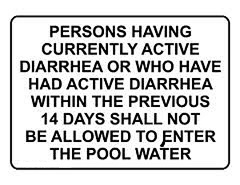Swimming and Illness Frequently Asked Questions
Can I get sick from swimming in a pool?
Yes, there are many illnesses that can be transmitted in pool water. However, the risk of contracting disease in a properly maintained pool is low. People can carry bacteria, viruses and parasites within their bodies and on their skin. Some of these organisms can be released into the pool water to infect other swimmers. Organisms may enter the body through the mouth, nose, ears, and eyes. Breaks in the skin can also be a route of transmission. Bathers should shower before entering a pool to remove contaminants from the skin. Bathers who have had diarrhea within 14 days or currently have open wounds are prohibited from swimming.
What type of diseases are communicable in pool water?
Skin, ear, nose, throat, and respiratory disease have been linked to swimming. The most common recreational illness contracted during pool use is Cryptosporidiosis. Cryptosporidium is a parasite that is shed in the feces of humans. The parasite enters the pool water through fecal accidents and by bathers who carry the organism on their skin. Swimmers are infected when they swallow contaminated pool water. This parasite causes diarrhea and abdominal upset. Other organisms that can infect swimmers are Hepatitis A (liver disease), Norwalk Virus (abdominal upset), Pseudomonas Bacteria (swimmer’s rash) and Giardia (parasite). There is no evidence that Covid-19 is transmitted in pool water.
Can I get sick from bathing in a spa pool?
Yes. The same diseases that are infectious in the swimming pool are also infectious in a spa pool. Spa pools have also been cited as a source of Legionnaires Disease. The Legionella Bacteria thrives in warm water and the turbulent action of the water jets can aerosolize organisms allowing a swimmer to breathe in the mist. Legionnaires Disease causes pneumonia in susceptible people.
Can my children get sick from playing in a spray ground?
Yes. Spray grounds are basically water playgrounds for children. The water is circulated and disinfected with a disinfectant like chlorine and by an ultraviolet (UV) light system. However, several diarrheal disease outbreaks have been associated with spray grounds. Children can be infected if they swallow water from spray jets or fountains that have been contaminated with feces. To prevent contamination, small children should be taken to the restroom regularly to prevent fecal accidents. Children should also be discouraged from drinking the water at the spray ground.
Who is most likely to become ill from swimming in contaminated water?
Small children, elderly people, and immunity compromised persons are at greatest risk to contract disease from contaminated pools.
Can I swim if I am sick?
California law prohibits anyone who currently has a communicable disease from swimming in a public swimming pool. This includes anyone who has had diarrhea within the past 14 days or currently has open wounds.
Doesn't chlorine kill all organisms in pool water?
No. Although chlorine is effective at killing most harmful organisms in pool water, not all are easily killed. The most common recreational illness is caused by the parasite, Cryptosporidium. This parasite envelopes itself in a tough outer covering called a cyst. Disinfectants can’t readily get past this barrier to kill the parasite. Swallowing the cyst may cause infection of the new host
What are my chances of becoming ill?
The risk of illness in a properly maintained pool is low. Public pools are required by law to maintain a level of disinfectant in the pool when operating. However, not all organisms are killed by the disinfectants used in pools. The pool water is circulated and filtered over time and larger contaminates are removed. Swimmers should take the following precautions to prevent introducing contaminates into the pool. Showering before entering a pool will remove contaminants from the skin. Bathers who have had diarrhea within 14 days or currently have open wounds are prohibited from swimming.
Report a Problem
If you observe code violations or would like to report an issue you may call the call center at (888) 700-9995 or to the Recreational Waters program at (626) 430-5360 or File a Complaint Online. In addition, inquiries can also be emailed to rhealth@ph.lacounty.gov





